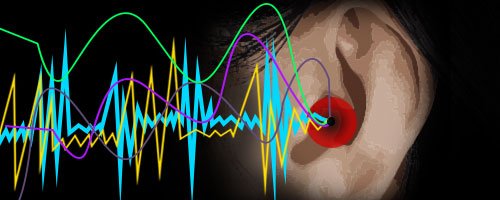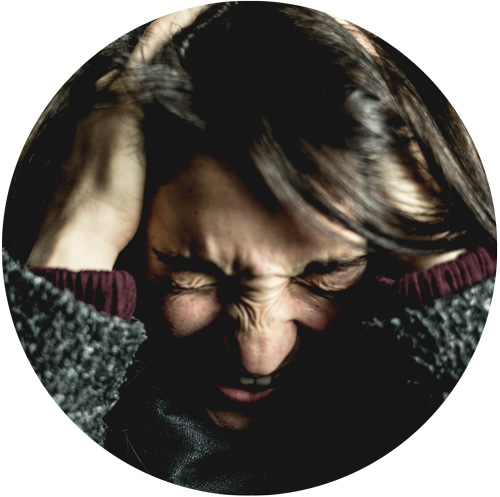Understanding Hyperacusis and Tinnitus

We've almost all been sensitive to sound at one time or another. But if you suffer from a chronic inability to tolerate everyday noises, you may suffer from a disorder known as hyperacusis.
Hyperacusis causes you to hear sounds as much louder than they really are. This means that anything from a car starting to people talking can aggravate you. Reactions can range from mild annoyance to losing your sense of balance or even having a seizure.
Complicating a diagnosis of hyperacusis can be a simultaneous diagnosis of tinnitus. Tinnitus is another hearing issue in which someone hears a buzzing or ringing in the ears. Tinnitus and hyperacusis are often diagnosed together.
Hyperacusis Causes
The cause of hyperacusis is the brain incorrectly hearing certain sound vibrations. A person hears the same sounds as everyone else, but his or her brain interprets them as louder than they really are.

Hyperacusis is rare, with only 1 in 50,000 people suffering from it. Most people aren't born with hyperacusis–rather, certain diseases, habits, and health conditions bring it on. They can include:
- A head injury
- Autism
- Depression
- Regular Valium use
- Post traumatic stress disorder
- Certain types of epilepsy
- Lyme disease
- Tay-Sachs disease
- Certain viral infections
- Ear damage
- Chronic fatigue syndrome
- Long-term exposure to loud noises
How Hyperacusis and Tinnitus Can Impact Your Life
Living with hyperacusis and tinnitus can have a profound impact on an individual's quality of life, affecting not only their physical well-being but also their emotional and social experiences. For many, the constant presence of ringing or other sounds in the ears (tinnitus) combined with an increased sensitivity to everyday noises (hyperacusis) can be overwhelming. Simple tasks such as going to the grocery store, attending a family dinner, or even watching television can become challenging due to the discomfort caused by background noises that others might find harmless. This condition can lead to feelings of frustration, anxiety, and isolation, as individuals may start avoiding social gatherings and public places to minimize their exposure to potentially distressing sounds.
The emotional toll of hyperacusis and tinnitus should not be underestimated. The persistent nature of these conditions can lead to significant stress and anxiety, affecting an individual's mental health and overall well-being. It's common for people with hyperacusis and tinnitus to experience mood swings, depression, and irritability, which can strain personal relationships and impact professional performance. Furthermore, the lack of understanding about these conditions from friends, family, and even some healthcare professionals can exacerbate feelings of loneliness and frustration. Creating a supportive environment that acknowledges the challenges posed by hyperacusis and tinnitus is crucial for helping individuals manage their symptoms and improve their quality of life.
In addition to personal struggles, hyperacusis and tinnitus can also affect daily routines and long-term plans. For example, career choices might be influenced by the need to avoid noisy work environments, and travel or leisure activities may be limited due to the anticipation of encountering distressing sounds. The financial impact should also be considered, as treatments, therapies, and lifestyle adjustments aimed at managing these conditions can be costly. Despite these challenges, there is hope for those living with hyperacusis and tinnitus. By seeking medical advice, exploring coping strategies, and connecting with support groups, individuals can find ways to mitigate the effects of these conditions and lead fulfilling lives. Understanding the comprehensive impact of hyperacusis and tinnitus on daily life is a crucial step towards developing effective management plans and advocating for greater awareness and support.
Treating Hyperacusis
An ear, nose, and throat doctor is typically the one to diagnose hyperacusis. He or she will ask you questions before administering a hearing test.
Treatment will depend on the underlying cause. Depending on what that is, some cases of hyperacusis will resolve on their own.
If that's not the case, a doctor will often suggest something called sound desensitization. This involves working with a specialist who will expose you to soft sounds before gradually increasing to the volume to louder sounds. Over time, your brain will learn how to tolerate louder sounds. The specialist will usually have you wear a device that plays static.
Some people have luck with other treatments not backed by solid research. They include acupuncture, relaxation exercises, and auditory integration therapy, a treatment in which you listen to music at different volumes during the day.
If you decide to use sound desensitization or auditory integration therapy to deal with hyperacusis, SleepPhones® headphones have been suggested as a solution. As the world's most comfortable headphones for sleeping, SleepPhones® headphones feature flat speakers in a soft, stretchy headband. They're comfortable enough to wear in bed–even if you sleep on your side. Learn more below!
Shop SleepPhones® Headphones to Help Mask and Fall Asleep with Hyperacusis and Tinnitus
For individuals living with hyperacusis and tinnitus, finding effective ways to mask triggering sounds and manage symptoms is crucial for improving quality of life. SleepPhones® headphones offer a comfortable and practical solution for masking hyperacusis and tinnitus triggers, especially during sleep. These innovative headphones are designed to be worn while sleeping, providing a gentle and soothing way to block out disturbing noises that can exacerbate hyperacusis and tinnitus.
By using SleepPhones® headphones to listen to calming music, white noise, or nature sounds, you can create a peaceful auditory environment that helps mask the ringing or discomfort associated with tinnitus and reduces your sensitivity to external noises. This can be particularly beneficial at night, as it allows you to fall asleep more easily and sleep more soundly, despite the presence of hyperacusis and tinnitus. Well-rested, you'll be better equipped to manage your symptoms during the day, improving your overall well-being and resilience.
SleepPhones® products are specifically designed with comfort in mind, making them ideal for wearing throughout the night. They come in various styles, including wireless models that offer freedom of movement without the inconvenience of cords. This means you can sleep in any position comfortably, without worrying about being tangled up or disturbed by your headphones. Additionally, SleepPhones® are made from soft, breathable materials that won't cause irritation or discomfort, even after extended wear.
Incorporating SleepPhones® headphones into your bedtime routine can be a simple yet effective strategy for managing hyperacusis and tinnitus. By creating a consistent sleep environment that is soothing and calming, you can better regulate your body's response to triggering sounds and reduce the stress associated with these conditions. Explore our range of SleepPhones® models and discover how they can help you mask hyperacusis and tinnitus triggers, leading to more restful nights and improved days.
Learn more about living with tinnitus at our "Tinnitus" resource page.
